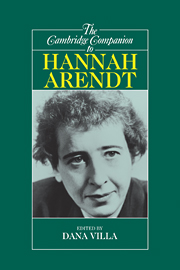Book contents
- Frontmatter
- Introduction
- PART I TOTALITARIANISM AND NATIONALISM
- PART II POLITICAL EVIL AND THE HOLOCAUST
- PART III FREEDOM AND POLITICAL ACTION
- PART IV ARENDT AND THE ANCIENTS
- 7 Arendt’s Hellenism
- 8 Athens and Rome
- 9 Equality and elitism in Arendt
- PART V REVOLUTION AND CONSTITUTION
- PART VI JUDGMENT, PHILOSOPHY, AND THINKING
- Select bibliography
- Index
9 - Equality and elitism in Arendt
from PART IV - ARENDT AND THE ANCIENTS
Published online by Cambridge University Press: 28 May 2006
- Frontmatter
- Introduction
- PART I TOTALITARIANISM AND NATIONALISM
- PART II POLITICAL EVIL AND THE HOLOCAUST
- PART III FREEDOM AND POLITICAL ACTION
- PART IV ARENDT AND THE ANCIENTS
- 7 Arendt’s Hellenism
- 8 Athens and Rome
- 9 Equality and elitism in Arendt
- PART V REVOLUTION AND CONSTITUTION
- PART VI JUDGMENT, PHILOSOPHY, AND THINKING
- Select bibliography
- Index
Summary
Hannah Arendt's idea of freedom can be said to have two main sources, the first being the Greek polis and the Roman res publica; the second St. Augustine and the Christian idea of a spontaneous new beginning (creatio ex nihilo). These two notions of freedom, which Arendt attempts to combine in her political theory, are not totally compatible. The first or republican idea of freedom is elitist in its content and presuppositions, whereas the second or Augustinian concept has an egalitarian core. This chapter examines both ideas, with specific attention to the tensions they generate in Arendt's work (section I). In the second (shorter and concluding) section, I show how Arendt's theory of political freedom is embedded in a narrative philosophy of history about the decline of man as a political animal, a narrative derived, for the most part, from the first (Graeco-Roman and elitist) concept of freedom. This concept of freedom also provides the normative basis for much of her critique of contemporary politics. We should, as a result, be somewhat skeptical about certain elements of this critique (Arendt's entirely negative view of politics as the quest for social justice, for example) even as we utilize her profounder insights about the nature of politics and freedom.
- Type
- Chapter
- Information
- The Cambridge Companion to Hannah Arendt , pp. 178 - 198Publisher: Cambridge University PressPrint publication year: 2000
- 18
- Cited by

